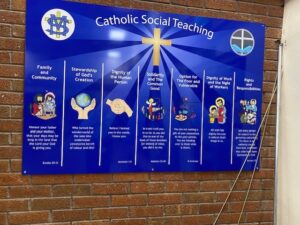CATHOLIC SOCIAL TEACHING
Catholic Social Teaching is: The underlying insight is that everyone has the right and responsibility to live in our world constructively, not destructively, and to ensure that we leave it in a better state than when we entered it.
At the core of Catholic Social Teaching are a number of key concepts and principles.
Chief among these are: justice, human dignity, the common good, the principles of participation, solidarity, and subsidiarity, the universal destination of the world’s goods, and the option for the poor.
Catholic Social Teaching calls us all as Catholics to work for the common good, help build a just society, uphold the dignity of human life and work for justice and the dignity of all our brothers and sisters, especially those in the greatest need.
What does Catholic Social Teaching look like in our school?
As the virtues in school- each year group is given a Catholic Social Teaching Action to focus on and show in their learning and daily lives. They have an animal symbol from Cafod to hold in discussions and to take on any outreach work. The school council have subsidiarity, whilst the Eco-team have the stewardship focus.
EYFS: Everyone is special- human Dignity
Y1: Participation
Y2: Distributive justice- fairness
Y3: Common Good
Y4:Option for the poor
Y5: Solidarity
Y6: Peace
VIRTUES
When we practice the Gospel Values and use them in our lives, they become part of our behaviour. Positive patterns of behaviour are virtues. Virtues can be understood as ‘good habits’ that improve our lives and bring us closer to God.
‘The aim of living virtuously is to grow closer to God.’
Positive habits shape our character and who we are. This forms the culture in our school, which link to our route to resilience characteristics.
St Thomas Aquinas, known as the doctor of the church, outlined the four Cardinal Virtues that we should practice in our lives.
- Prudence is making the right decisions for the right reasons (Wisdom).
- Justice is being fair to everyone (Fairness).
- Fortitude having the courage and the strength to do the right thing even when you are afraid. (Courage).
- Temperance is self-control – resisting the temptation to do something wrong. (Self-control).
The Church also teaches that there are 3 Theological Virtues – these are virtues given to us by the Grace of God when we practice the four main virtues. The Theological Virtues are Faith, Hope and Charity.
- Faith is believing in God and trusting in what He tells us. (Belief in God)
- Hope is that we trust God will fulfil his promises and look forward to eternal life with God (Trust in God)
- Charity is we love God and love our neighbour as our self. (Love of God and Love of neighbour)
At St Mary’s, we focus on the formation of the whole child. Virtues education is fundamental to Catholic character education; we strive to help our children become virtuous, successful members of society and members of the community.
- Each Year Group will focus on a different virtue and explore the significance of that virtue through learning, prayer and reflection. The scriptures and lives of the Saints offer a rich store of inspiration and explanation for our children in order to illuminate the virtues.
EYFS-Love
Year One: Faith
Year Two: Hope
Year Three: Courage-Fortitude
Year Four: Self -control-Temperance
Y5: Justice
Y6 : Wisdom -Prudence


